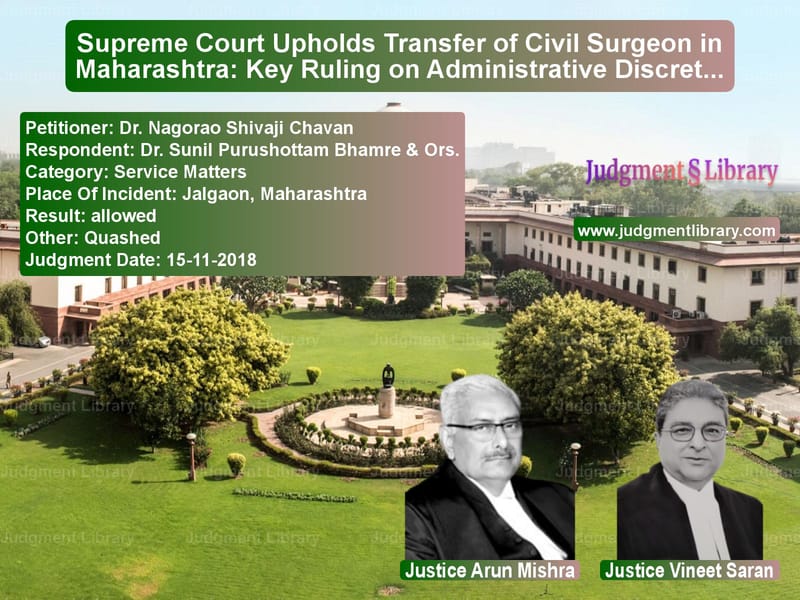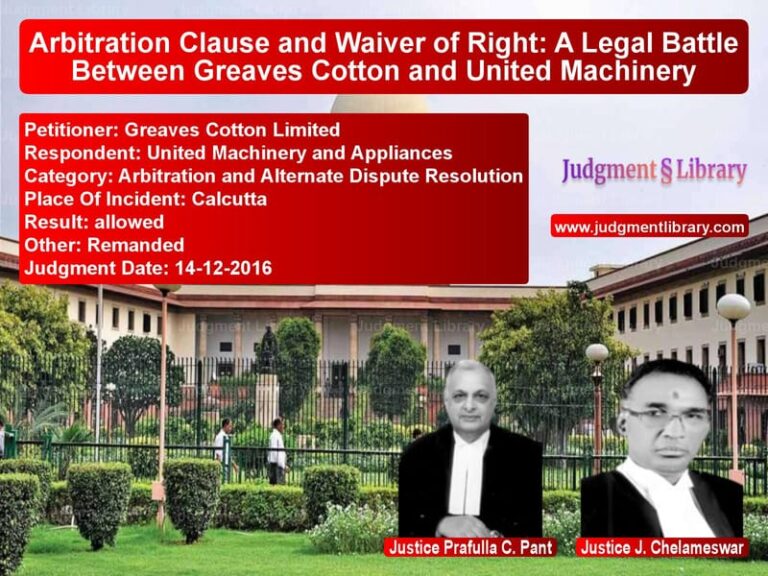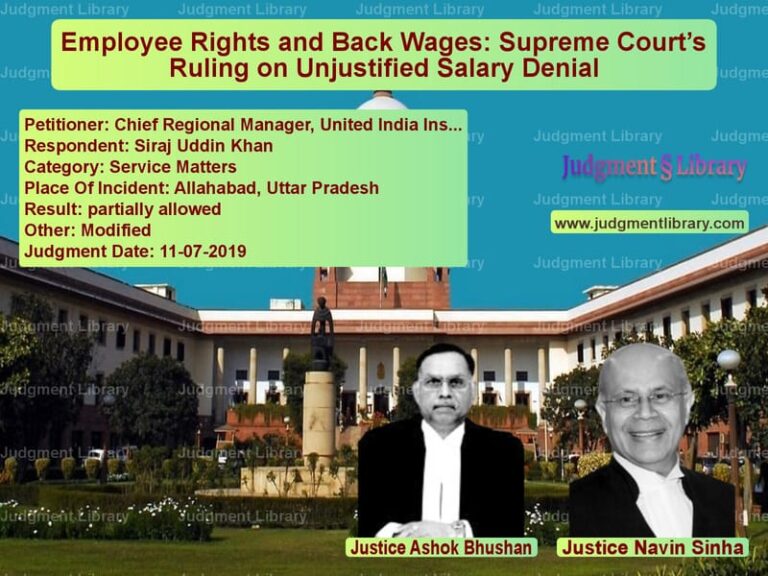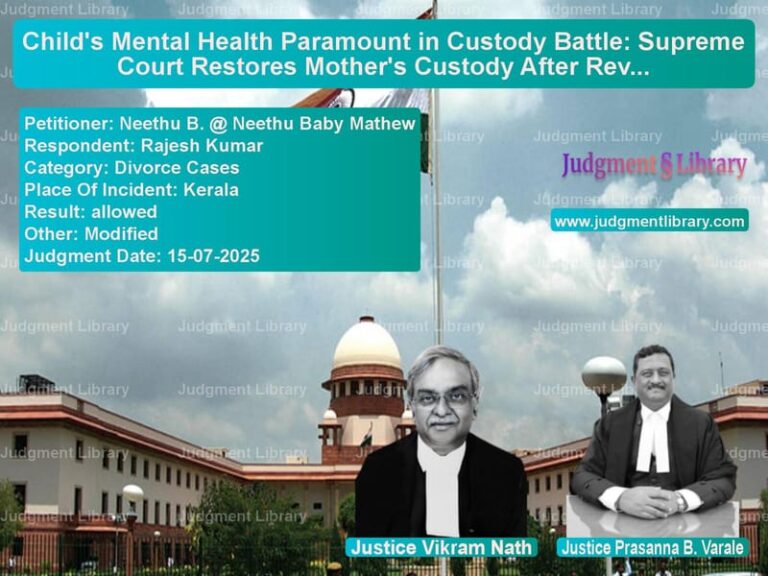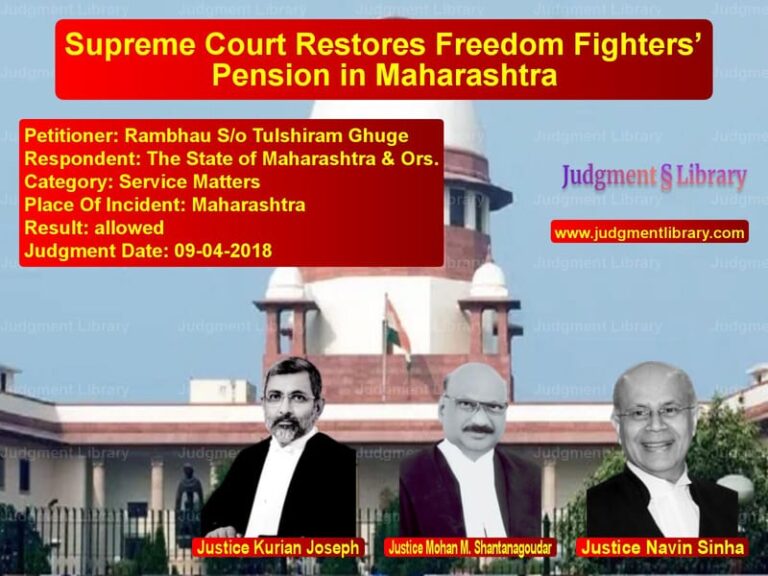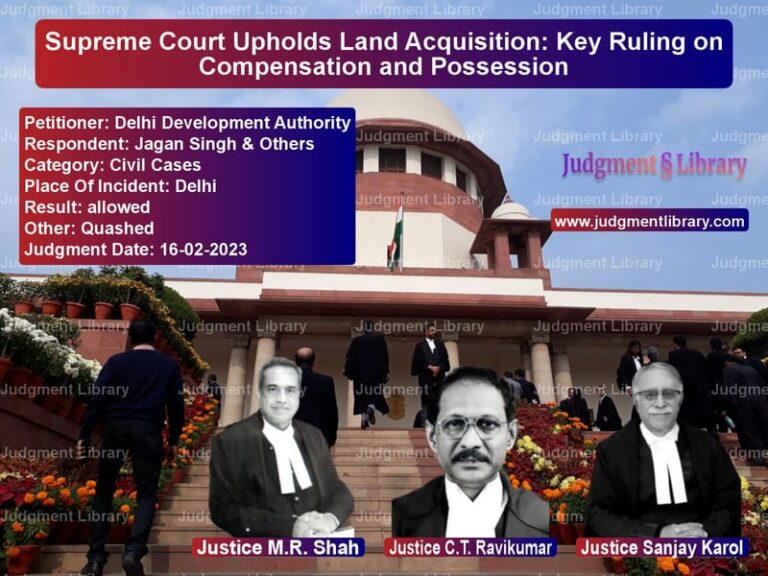Supreme Court Upholds Transfer of Civil Surgeon in Maharashtra: Key Ruling on Administrative Discretion
The case of Dr. Nagorao Shivaji Chavan vs. Dr. Sunil Purushottam Bhamre & Ors. involved a dispute over the transfer of a government medical officer in Maharashtra. The Supreme Court was called upon to decide whether the transfer order issued by the state government was legally valid and justified under the Maharashtra Government Servants Regulation of Transfers and Prevention of Delay in Discharge of Official Duties Act, 2005.
The appeal was filed by Dr. Nagorao Shivaji Chavan, who had been transferred as the Civil Surgeon of General Hospital, Jalgaon. His appointment was challenged by the previous Civil Surgeon, Dr. Sunil Purushottam Bhamre, who was transferred to another post. The Maharashtra Administrative Tribunal (MAT) had ruled in favor of Dr. Bhamre, but the Bombay High Court declined to interfere in the matter. The Supreme Court ultimately overturned the tribunal’s order and upheld the government’s decision to transfer Dr. Bhamre.
Background of the Case
On August 5, 2017, the Maharashtra government issued a transfer order affecting 67 doctors, including Dr. Bhamre and Dr. Chavan. Dr. Bhamre was transferred from the post of Civil Surgeon, Jalgaon, to the position of Assistant Director at the AIDS Control Society, Wadala, Mumbai. In his place, Dr. Chavan was appointed as the new Civil Surgeon of Jalgaon.
Dr. Bhamre challenged the transfer order on the grounds that he had not completed his mandatory three-year tenure at Jalgaon. He argued that his transfer was arbitrary and violated the provisions of the Maharashtra Government Servants Regulation of Transfers Act, 2005.
Allegations Against Dr. Bhamre
Several allegations were raised against Dr. Bhamre, including financial irregularities and insubordination. The Chief Executive Officer of Jalgaon Zila Parishad had written to the Commissioner of Health Services, pointing out multiple procedural violations committed by Dr. Bhamre during his tenure as Civil Surgeon.
To investigate these allegations, a committee was constituted, which found a prima facie case against Dr. Bhamre. The committee submitted its findings on August 18, 2017, confirming procedural violations and mismanagement in financial matters.
Arguments by the Petitioner (Dr. Chavan)
- The transfer of government servants is an administrative decision, and courts should not interfere unless there is clear evidence of mala fide intentions.
- Dr. Bhamre’s tenure was marred by allegations of financial irregularities, which justified his transfer.
- The Maharashtra Government Servants Regulation of Transfers Act allows exceptions to the three-year tenure rule in cases of administrative exigency.
- The tribunal had erred in relying on Sections 3 and 4 of the Transfer Act without considering the exceptions provided in the law.
Arguments by the Respondents (Dr. Bhamre)
- Dr. Bhamre contended that he was being unfairly transferred before completing his tenure, violating the statutory provisions governing government servants.
- He argued that there was no substantial proof of financial irregularities, and the transfer order was issued without due process.
- The transfer was a punitive action disguised as an administrative decision.
- The tribunal had correctly ruled in his favor, and the High Court rightly declined to interfere.
Supreme Court’s Judgment
The Supreme Court, after carefully examining the legal provisions and the circumstances surrounding the case, ruled in favor of the Maharashtra government and Dr. Chavan. The key findings of the Court were:
- The normal tenure of three years for government servants is not an absolute right; administrative exigencies may justify early transfers.
- There were serious allegations of financial mismanagement and procedural violations against Dr. Bhamre, warranting his transfer.
- The tribunal erred in interpreting Sections 3 and 4 of the Transfer Act, as they allow for exceptions in special cases.
- Dr. Bhamre had previously failed to report to his transferred post for over five years, which weakened his claim of wrongful transfer.
- “Notwithstanding the provisions contained in Section 3, in exceptional circumstances or in the case of administrative exigencies, transfer is permissible, and no absolute bar on transfer is created by virtue of the provisions contained in Section 3 read with Section 4.”
- Dr. Bhamre was directed to report to his new posting in Mumbai within 15 days, failing which disciplinary proceedings would be initiated against him.
The Court observed:
“The Government is the best judge to decide how to distribute and utilize the services of its employees. However, this power must be exercised honestly, bona fide, and reasonably. It should be exercised in public interest.”
Implementation of the Judgment
The Supreme Court directed the Maharashtra government to ensure compliance with its order and warned Dr. Bhamre of disciplinary action if he failed to report to his new posting. The state government was required to submit a compliance report within 15 days.
Significance of the Judgment
The Supreme Court’s ruling in this case reinforced the principle that government servants do not have an absolute right to remain in a particular posting. Administrative decisions, particularly in cases involving allegations of misconduct, must be respected unless there is clear evidence of mala fide intent.
This judgment sets an important precedent in public service law, affirming that courts should be cautious in interfering with transfer orders unless they are demonstrably arbitrary or illegal. The ruling also highlights the need for maintaining discipline and accountability within government departments.
Conclusion
The Supreme Court’s decision to uphold Dr. Bhamre’s transfer underscores the judiciary’s commitment to upholding administrative discipline. By allowing the Maharashtra government to proceed with its transfer decision, the Court reaffirmed that transfers are an integral part of government service and cannot be challenged unless there is clear evidence of bias or illegality.
This case serves as a reminder that while employees have certain rights, those rights must be balanced with the government’s duty to ensure efficient administration. The ruling is expected to guide future cases involving transfer disputes and reinforce the principle that administrative necessity can justify early transfers, provided they are made in good faith.
Petitioner Name: Dr. Nagorao Shivaji Chavan.Respondent Name: Dr. Sunil Purushottam Bhamre & Ors..Judgment By: Justice Arun Mishra, Justice Vineet Saran.Place Of Incident: Jalgaon, Maharashtra.Judgment Date: 15-11-2018.
Don’t miss out on the full details! Download the complete judgment in PDF format below and gain valuable insights instantly!
Download Judgment: Dr. Nagorao Shivaji vs Dr. Sunil Purushotta Supreme Court of India Judgment Dated 15-11-2018.pdf
Direct Downlaod Judgment: Direct downlaod this Judgment
See all petitions in Employment Disputes
See all petitions in Transfers Cases
See all petitions in Public Sector Employees
See all petitions in Judgment by Arun Mishra
See all petitions in Judgment by Vineet Saran
See all petitions in allowed
See all petitions in Quashed
See all petitions in supreme court of India judgments November 2018
See all petitions in 2018 judgments
See all posts in Service Matters Category
See all allowed petitions in Service Matters Category
See all Dismissed petitions in Service Matters Category
See all partially allowed petitions in Service Matters Category

